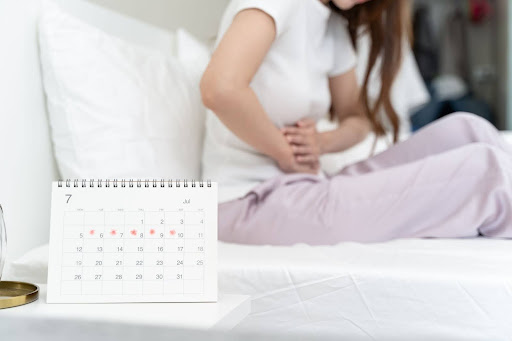 Kernodle Clinic - A DukeMedicine PRACTICE
Kernodle Clinic - A DukeMedicine PRACTICE
- Burlington 336-538-1234
- Mebane 919-563-2500
- Elon Family 336-538-2314
- Elon Pediatrics 336-538-2416
7 Tips To Help Ease Menstrual Cramps

When that time of the month comes around, you may get a little snippy, extra hungry, and be on cautious look-out for the dreaded menstrual cramps. If you know what we’re talking about, you’re not alone. Approximately 80% of people who have periods experience menstrual cramps at some point in their lifetime.
Period Pain Relief
Menstrual cramps, a common occurrence, can disrupt daily activities and impact a woman’s overall well-being. While cramps are a natural part of the menstrual cycle, there are several tips and techniques that can help alleviate discomfort and promote a sense of relief. Here at Kernodle OB/GYN, we explore seven effective tips to ease menstrual cramps.
Easing Menstrual Cramp Symptoms
1. Heat Therapy
One of the simplest yet most effective ways to relieve menstrual cramps is through the application of heat. Heat helps to relax the uterine muscles, reducing the intensity of cramps. A hot water bottle, heating pad, or even a warm bath can provide soothing relief. Applying heat to the lower abdomen for 15-20 minutes at a time can significantly ease discomfort and promote relaxation. This natural remedy is easily accessible and can be incorporated into daily routines.
2. Hydration And Nutrition
Maintaining proper hydration and a well-balanced diet is crucial for overall health, and it can also impact menstrual cramps. Dehydration can exacerbate cramps, so ensuring an appropriate intake of water is essential. Additionally, incorporating foods rich in anti-inflammatory properties, such as fruits, vegetables, and omega-3 fatty acids, can help reduce inflammation and alleviate cramp severity. Avoiding excessive caffeine and salty foods can also contribute to a more comfortable menstrual experience.
3. Regular Exercise
Engaging in regular physical activity has numerous health benefits, and it can be particularly effective in managing menstrual cramps. Exercise helps increase blood flow and releases endorphins, which act as natural pain relievers. Activities like brisk walking, swimming, or yoga can be gentle yet effective in reducing cramp intensity.
4. Relaxation Techniques
The mind-body connection plays a significant role in managing menstrual cramps. Practicing relaxation techniques, such as deep breathing, meditation, or mindfulness, can help alleviate stress and tension, contributing to a reduction in cramp severity. Integrating these practices into daily life, especially during the menstrual period, can foster a sense of calm and balance.
5. Get Adequate Rest
Sleep seems to help with a wide range of problems, and menstrual cramps are on that list. In fact, heavy menstrual bleeding often causes women to feel tired, commonly known as period fatigue. This makes it crucial to prioritize sufficient sleep, especially during the follicular phase of your menstrual cycle.
6. Try Over-The-Counter (OTC) Medication
When natural remedies aren’t doing the trick, over-the-counter medications can help relieve abdominal cramping associated with menstruation. Ibuprofen (Advil, Motrin IB, others) or naproxen sodium (Aleve) can help treat period cramps by reducing inflammation. It is important to contact your healthcare provider before taking any medications.
7. Consider Hormonal Birth Control
Another option is hormonal contraception. Birth control pills, also known as oral contraceptive pills (OCPs), may help some people have less severe period cramps. In simple terms, these pills can make period pain less by lowering something called prostaglandins. Prostaglandins can influence the perception of pain, making menstrual cramps easier to deal with.
Menstrual cramps are a common and natural aspect of the menstrual cycle, but there are many tips and tricks to keep the pain associated with your period at bay. At Kernodle OB/GYN, we are gynecological healthcare specialists who can help guide you through any concerns you may have about your health and well-being. If you have questions about menstrual cramps, or want to schedule an appointment, call (336) 538-2367.
